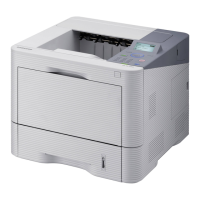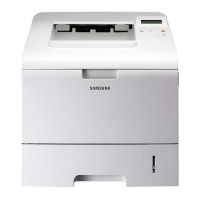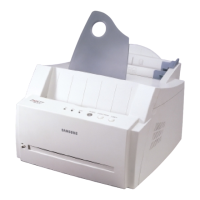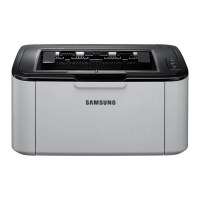Do you have a question about the Samsung ML-4512ND and is the answer not in the manual?
Details key product features like eco-functionality, print quality, speed, convenience, and expandability.
Compares features and options for ML-451x and ML-501x series, noting regional differences.
Provides answers to common user questions on printing issues, consumables, status indicators, and driver downloads.
Explains manual structure, notation conventions (icons, terms), and variations between models.
Details critical safety warnings, operational guidelines, and handling precautions for safe product use.
Illustrates and lists product components, accessories like power cord, toner, software CD, and manuals.
Explains the function of each button and display element on the A and B type control panels.
Provides step-by-step instructions on connecting the power cord and turning on the product.
Guides local driver installation on Windows via software CD, covering setup options and search methods.
Explains how to uninstall and reinstall the printer driver for correct functioning.
Introduces network management tools like SyncThru™ Web Service, Admin Service, and SetIP for monitoring.
Details product connection via cable and network setup through display or software, including printing reports.
Guides Windows driver installation for networked printers, covering setup options and search methods.
Explains enabling and using IPv6, covering manual and DHCP address configuration.
Introduces wireless network concepts and guides setup using WPS, USB cable, or WLAN settings.
Explains printable information items like menu maps, device settings, consumable status, and test prints.
Covers settings for paper orientation, margins, duplex printing, and stapling position.
Details settings for paper handling, copy count, multi-purpose trays, paper feeding, and paper check messages.
Explains settings for image quality like resolution, text boldness, and toner density adjustments.
Covers system settings like date/time, display language, power saving, and auto-continue options.
Explains emulation settings for printer language and communication protocols.
Details network settings including TCP/IP, Ethernet speed, authentication, wireless setup, and network information.
Covers administrator settings for password protection, management, and security features.
Explains Eco mode for saving toner and paper, and how to configure these settings.
Provides information on active, secured, stored, and completed print jobs.
Explains adjusting print quality based on installation altitude, with instructions for various OS.
Details changing font settings for different languages and lists available fonts.
Guides on changing basic print settings via Windows print dialog and accessing print preferences.
Explains how to designate a specific printer as the default in Windows.
Introduces advanced print features like XPS printing and printing files directly to a PRN file.
Explains using the Direct Printing Utility to print PDF files without opening them in an application.
Describes features related to memory and large capacity storage for print job management.
Guides basic printing and print setting adjustments on Macintosh OS.
Explains printing from Linux applications using CUPS, including environment and property settings.
Guides print job execution and setting changes via UNIX driver and Print Job Manager.
Provides information on ordering consumables and optional parts via sales channels or Samsung's website.
Lists available consumables like toner cartridges and imaging units with part numbers and yields.
Details optional parts for enhancing performance, such as memory, paper trays, and connectors.
Lists essential maintenance parts like fuser, rollers, with service life and replacement recommendations.
Explains how to redistribute toner for print quality improvement and care for spills.
Provides step-by-step instructions for replacing the toner cartridge, including precautions.
Details the process for replacing the imaging unit, with handling and light exposure precautions.
Provides information on upgrading product memory, referencing optional parts section.
Explains how to install large capacity storage, referring to optional parts.
Provides information on replacing the stapler cartridge, referring to optional parts section.
Explains how to check consumable life via product menu or software for proactive replacement.
Details how to configure toner low warnings via messages or LED indicators.
Provides instructions for cleaning product exterior and interior to maintain print quality and longevity.
Offers tips for preventing paper jams via correct paper selection, loading, and handling.
Provides step-by-step instructions for clearing paper jams from various product locations.
Explains how to interpret product status LED lights for diagnosing and resolving issues.
Lists common error messages, their meanings, and corresponding troubleshooting steps.
Details general product specifications: dimensions, weight, noise, operating conditions, and power requirements.
Provides laser safety declarations, warnings, and compliance statements for various regions and standards.
States copyright information, terms of use, and intellectual property notices for Samsung and third parties.
| Wi-Fi | No |
|---|---|
| Network ready | Yes |
| Cabling technology | 10/100/1000Base-T(X) |
| Ethernet LAN data rates | 10, 100, 1000 Mbit/s |
| Print technology | Laser |
| Maximum resolution | 1200 x 1200 DPI |
| Time to first page (black, normal) | 7 s |
| Print speed (black, normal quality, A4/US Letter) | 45 ppm |
| Maximum duty cycle | 200000 pages per month |
| Number of print cartridges | 1 |
| Processor model | Samsung Dual Core |
| Maximum internal memory | 640 MB |
| Sound pressure level (printing) | 54 dB |
| Sound pressure level (quiet mode) | 30 dB |
| Display | LCD |
| Total input capacity | 520 sheets |
| Total output capacity | 500 sheets |
| Maximum input capacity | 1140 sheets |
| Envelopes sizes | 9, 10, C5, C6, DL |
| Maximum print size | 216 x 297 mm |
| Paper tray media types | Bond paper, Card stock, Envelopes, Labels, Plain paper, Pre-Printed, Recycled paper, Transparencies |
| Non-ISO print media sizes | Executive (184 x 267mm), Folio (media size), Index card, Letter (media size), Oficio (media size), Statement (140 x 216mm) |
| ISO A-series sizes (A0...A9) | A4, A5, A6 |
| ISO B-series sizes (B0...B9) | B5 |
| Photo paper sizes (imperial) | 3.5x5 \ |
| Maximum ISO A-series paper size | A4 |
| Standard interfaces | USB 2.0 |
| USB 2.0 ports quantity | USB 2.0 ports have a data transmission speed of 480 Mbps, and are backwards compatible with USB 1.1 ports. You can connect all kinds of peripheral devices to them. |
| Other operating systems supported | IBM AS/400 |
| Server operating systems supported | Windows 2000 Server, Windows Server 2003, Windows Server 2008 |
| Power consumption (standby) | 12 W |
| Power consumption (printing) | 1400 W |
| Power consumption (PowerSave) | 4.5 W |
| Energy efficiency class | - |
| Compatible operating systems | Windows 2000/XP (32/64 bit)/2003 Server (32/64 bit)/Vista (32/64 bit)/2008 Server (32/64 bit)/7/2008 Server R2 [Linux] RedHat Enterprise Linux WS 4, 5 (32/64 bit) - Fedora 5, 6, 7, 8, 9, 10, 11, 12, 13 (32/64 bit) - SuSE Linux 10.1 (32 bit) - OpenSuSE 10.2, 10.3, 11.0, 11.1, 11.2 (32/64 bit) - Mandriva 2007, 2008, 2009, 2009.1, 2010 (32/64 bit) - Ubuntu 6.06, 6.10, 7.04, 7.10, 8.04, 8.10, 9.04, 9.10, 10.04 (32/64 bit) - SuSE Linux Enterprise Desktop 10, 11 (32/64 bit) - Debian 4.0, 5.0 (32/64 bit) Mac OS X 10.3~10.6, [UNIX] Sun Solaris 9, 10 (x86, SPARC), HP-UX 11.0, 11i v1, 11i v2, 11i v3 (PA-RISC, Itanium), IBM AIX 5.1, 5.2, 5.3, 5.4 SAP AS400 CiTRIX WHQL |
| Dimensions (WxDxH) | 418 x 358 x 435 mm |
|---|











